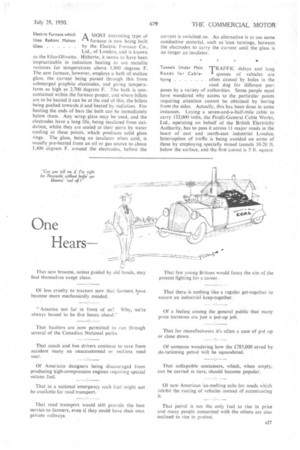One Hears
Page 29

If you've noticed an error in this article please click here to report it so we can fix it.
That new brooms, unless guided by old hands, may find themselves swept clean.
Of less cruelty to tractors now that farmers have become more mechanically minded.
America not far in front of us? Why, we're always bound to be five hours ahead."
That hauliers are now permitted to run through several of the Canadian National parks.
That coach and bus drivers continue to save from accident many an unaccustomed or reckless road user.
Of American designers being discouraged from producing high-compression engines requiring special octane fuel.
That in a national emergency such fuel might not be available for road transport.
• That road transport would still provide the best service to. farmers, even if they could have their own private railways . That few young Britons would fancy the site of the present fighting for a career.
That there is nothing like a regular get-together to ensure an industrial keep-together.
Of a feeling among the general public that many price increases are just a put-up job.
That for manufacturers it's often a case of put up
or close down. (s, Of someone wondering how the £785,000 saved by . de-rationing petrol will be squandered.
That collapsible containers, which, when empty, can be carried in tiers, should become popular.
Of new American ice-melting salts for roads which inhibit the rusting of vehicles instead of accentuating it.
That petrol is not the only fuel to rise in price and many people concerned with the others arc also inclined to rise in protest.












































































